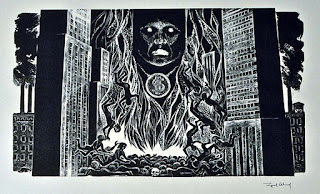“Let me take you on a trip
Around the world and back
And you won't have to move” (Depeche Mode, 1990)
or me, it was inevitable to remember these lines while I was reading The Catcher in the Rye. For me it seems fascinating the ability that Holden Caulfield has regarding being in two places at the same time, and I think that it has to do with what Stradlater asked him: “a description”. The description of the World outside Caulfield seems exasperatingly static: most of the people act in the exact terrible way, and what happens when you have an uniform mass? You’re stuck, there’s no flow. I think that flow takes place mostly inside Holden’s mind, and what could he do if the world surrounding him does not satisfy him at all? :“I'm lucky, though. I mean I could shoot the old bull to old Spencer and think about those ducks at the same time. It's funny. You don't have to think too hard when you talk to a teacher. All of a sudden, though, he interrupted me while I was shooting the bull. He was always interrupting you”
(Salinger, 1951, p.7)
Reality is full of phonies and touchy subjects, but I think that one of the ideas that freaks Holden out the most is the shallowness with which most of the people faces life. Everything is seen, but just in the surface, almost nothing is authentic, almost everything is dictated by conventions and the way in which people want to be seen by other people. Communication is almost an illusion, and I think that that’s the main reason why Caulfield is all the time living the moment, and in parallel, rationalizing that moment. His doubts, his ideas , his nuisances and his complains are the partners that he cannot find in the real world.
In the beginning, when Holden goes to say good-by to his teacher, he is received by the teacher’s wife. She is partially deaf, so for her is difficult to communicate with Holden. On the other hand, the teacher does not have a physical limitation which could inhibit him from listening; he does not listen just because he does not want to, and he needs to act according to the role that society has already chosen for him:
"I flunked you in history because you knew absolutely
nothing." "I know that, sir. Boy, I know it. You couldn't help
it." "Absolutely nothing," he said over again. That's something
that drives me crazy. When people say something twice that way, after you admit
it the first time. Then he said it three times. "But absolutely nothing. I
doubt very much if you opened your textbook even once the whole term. Did you? Tell the truth, boy."
I think that introducing in the same situation a person anatomically partially deaf and a person who is intentionally deaf fulfils the purpose of showing how communication tends to disappear as you grow up in life.
I want to focus specially in the episode when Holden notices that Stradlater is going to have a date with Jane Gallagher. First, Holden Cautfield is pretty upset because of his roommate’s behaviour.
“"Hey," Stradlater said. "Wanna do me a big favor?"
"What?" I said. Not too enthusiastic. He was always asking you to do him a big favor. You take a very handsome guy, or a guy that thinks he's a real hot-shot, and they're always asking you to do them a big favour. Just because they're crazy about themseif, they think you're crazy about them, too, and that you're just dying to do them a favour. It's sort of funny, in a way.”
( Salinger, 1991, p.15 )
For Stradlater, the world spins around him, and he sees himself as a product to sell. I believe that J. D. Salinger has represented to Stradlater as an exaggeration on how this non-communicative world works. In general, the adults presented in this book show an almost total lack of interest. A similar situation occurred when Caulfield’s brother dies. His fathers were not emphathetic when that brother des, and they considered that the way in which he burst when his brother died was not appropriate.
For me, Calfield does not only hate phony or touchy people. He is angry because of the lack of emotions that peoples experiences, and also, the lack of interest in gettint to know each others.







